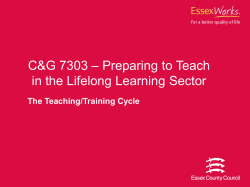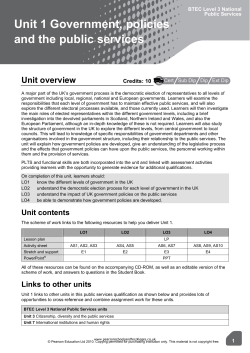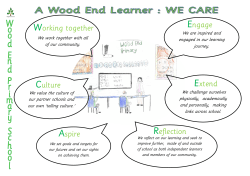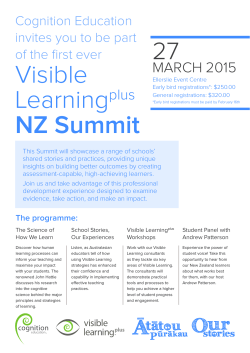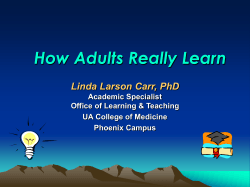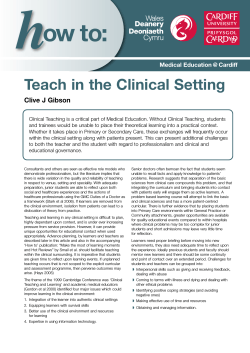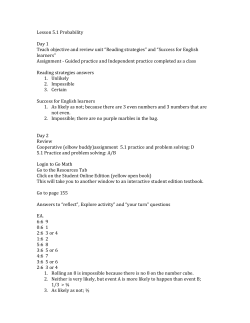
Reviewing own practice: resources This handout will cover: ⢠Why
Reviewing own practice: resources This handout will cover: Why review your practice? How can you review your practice? Feedback from others How can you obtain the views of learners and others? What is reflective practice? A straightforward method of reflection (EDAR) Areas for improvement: resources Reading list Website list Why review your practice? • • • To evaluate the effectiveness of your practice when using resources. To improve the learner experience. To enable you to develop and improve your practice. You should never assume everything is going well just because you think it is. The review process should take into account the views of learners and others you come into contact with. Reviewing your practice will also help you identify any problems or concerns, enabling you to do things differently next time. How can you review your practice? • • • • • Talking to learners: formally and informally. Issuing a questionnaire or evaluation form. Using online surveys. Reflecting on your practice and/or writing a learning journal. Asking for feedback from others who use similar resources (i.e. colleagues, managers, mentors, peers, workplace supervisors, learning support workers, teaching assistants and volunteers). Talking to your learners informally will help you realise how successful the use of resources has been. This can be done during tutorial reviews, at break times, or before or after your sessions. Your learners are the best judges of whether they are getting what they feel they need. If given the opportunity, they may give you more feedback in an informal situation. When giving learners a questionnaire or an evaluation form, always build in time to your session for this to take place, otherwise your learners might take it away and forget to return it. Alternatively, you could create an online survey for learners to access at an appropriate time and place. When issuing questionnaires or using online surveys, decide whether you want the responses to be anonymous, as you might gain more feedback if learners know they can’t be identified. Always give a date for their return, C9015 (V1) Copyright Ann Gravells www.anngravells.co.uk Page 1 of 4 Gravells A & Simpson S (2014) Passing Assessments for the Certificate in Education and Training London SAGE Learning Matters otherwise people will take their time and then might forget. The response rate is not usually high when people are left to complete them in their own time. Therefore, if you can allow time during a session for your learners to complete them, you should receive a higher response. You might decide to use a mixture of open and closed questions when designing your questionnaire. Open questions always require a full response and give you qualitative data to work with, i.e. quality feedback. Closed questions obtain only a yes or no answer and give you quantitative data, i.e. enabling you to add up the quantity (number) of responses. If you use a closed question, try and follow this up with an open question to enable you to obtain further qualitative information. It might take longer for you to read and analyse the responses, but you will have something more substantial to help with the evaluation process. What works with one learner or group might not work well with others, perhaps due to their individual learning preferences or other influences. Don’t change something for the sake of it; if it works, hopefully it will continue to work. Feedback from others This can include: • • • • • • • appraisal and review meetings awarding organisation visits external inspection reports e.g. Ofsted good news stories, i.e. organisational newsletters, local press, online stories internal and external quality assurance reports peer observation reports comments from referral agencies, i.e. Job Centre Plus, National Careers Service. Feedback can help you review your progress and will help you learn about yourself and what you could improve. For example, how you react to different situations or learners, how patient you are and what skills you may need to develop. You might also decide you need further training or support to improve your subject knowledge, your teaching/assessing skills and/or English, maths and ICT skills. You could read your organisation’s last Ofsted inspection report (if applicable) regarding the use of initial and diagnostic assessment, and how teachers plan their sessions. You could review the strengths and areas for improvement, relate these to your own practice and identify if you need to make any changes as a result. How can you obtain the views of learners and others? • • • Design surveys and questionnaires for learners and others involved in the teaching, learning and assessment process. Hold informal or formal discussions with others (e.g. face to face, telephone, online). Read relevant reports and feedback. C9015 (V1) Copyright Ann Gravells www.anngravells.co.uk Page 2 of 4 Gravells A & Simpson S (2014) Passing Assessments for the Certificate in Education and Training London SAGE Learning Matters A free program www.surveymonkey.com can be used to design a questionnaire. It generates a weblink for learners to access and the program will automatically analyse the results. Remember to keep the questions in the survey simple and to the point. What is reflective practice? Reflective practice is a process of self-evaluation and is a good way of ensuring you are carrying out your role effectively. When evaluating your own practice, you need to consider how your own behaviour has impacted upon others and what you could do to improve. It is an analysis of your actions which should lead to an improvement in practice. It can be written down, or just thought through There are many reflective practice theorists such as Brookfield (1995) and Schon (1983) which you might like your learners to research if you have time. A straightforward method of reflection (EDAR) A straightforward method of reflection is to have an experience, then describe it, analyse it and revise it (EDAR) (Gravells & Simpson 2014). This method incorporates the WWWWW and H (who, what, when, where, why and how) approach and should help you consider ways of changing and/or improving. As a result, you might find your own skills improving, for example giving more effective, constructive and developmental feedback to your learners. Part of reflection is about knowing what you need to change. If you are not aware of something that needs changing, you will continue as you are until something serious occurs. You may realise you need further training or support in some areas. • • • • Experience – a significant event or incident you would like to change or improve. Describe – aspects such as who was involved, what happened, when it happened and where it happened. Analyse – consider the experience deeper and ask yourself how it happened and why it happened. Revise – think about how you would do it differently if it happened again and then try this out if you have the opportunity. Areas for improvement: resources Areas could include: • • • • The time taken to prepare, adapt and/or use resources Communication between yourself and your learners regarding how to use the resources The clarity of text and pictures used in handouts and presentation materials The accessibility of resources such as computers and other equipment C9015 (V1) Copyright Ann Gravells www.anngravells.co.uk Page 3 of 4 Gravells A & Simpson S (2014) Passing Assessments for the Certificate in Education and Training London SAGE Learning Matters Reading list Gravells A & Simpson S (2014) The Certificate in Education and Training London SAGE Learning Matters Gravells A & Simpson S (2014) Passing Assessments for the Certificate in Education and Training London SAGE Learning Matters Machin et al (2013) A Complete Guide to the Level 4 Certificate in Education and Training Northwich Critical Publishing Moon J (2006) Learning Journals: A Handbook for Reflective Practice and Professional Development (2nd Edn) Oxford Routledge Rodgers A & Horrocks N (2010) Teaching Adults Maidenhead OU Press Roffey-Barentsen, J & Malthouse, R (2013) Reflective Practice in Education and Training (2nd Edn) Exeter Learning Matters Website list English and Maths free support – www.move-on.org.uk Online surveys – www.surveymonkey.com Reflective practice - http://www.brainboxx.co.uk/a3_aspects/pages/Reflective.htm Resources for teachers – www.anngravells.co.uk/resources C9015 (V1) Copyright Ann Gravells www.anngravells.co.uk Page 4 of 4 Gravells A & Simpson S (2014) Passing Assessments for the Certificate in Education and Training London SAGE Learning Matters
© Copyright 2025

